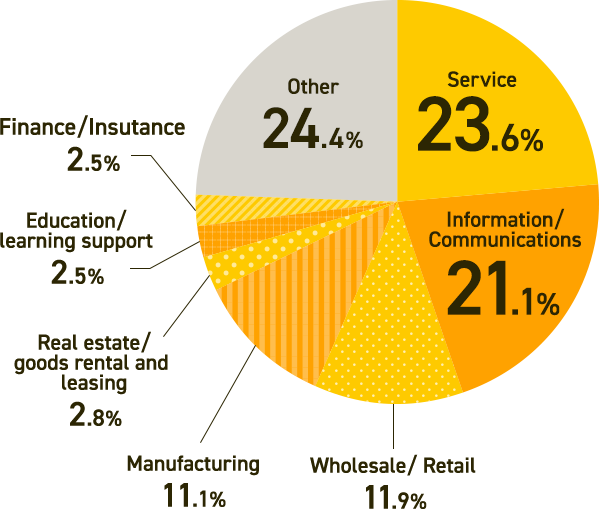CURRICULUM
CURRICULUM
Refine and advance world-class business skills through practice The College of International Management applies three educational methods that emphasizes practice and experience, by consolidating four areas of study that include entrepreneurship and business operations. In particular, students will acquire international standard business skills through the Capstone course, n which they work on solving actual corporate problems.
Common Education
An evolved, university-wide learning program that ties in with and supports undergraduate studies APU will further develop its exceptionally global environment and education to cultivate basic skills that are sought by today’s society. We strengthened university-wide training, which includes the first-year program utilizing international education on-campus housing, the introduction of ICT and data science education, and leveraging networks on and off campus. We thus promote learning within each college as well as studying issues that connect with the world today.
Curriculum Outline
The APM curriculum provides an outline of the subjects that can be taken and the requirements for graduation. The curriculum that a student will study under depends on the year they enter the university. Except in the case when a student switches colleges, students will study under the same curriculum until they graduate. New students enrolled in spring 2023 or later will follow the 2023 curriculum.
The subjects of the College of International Management are arranged in order starting from foundational subjects. In the curriculum outline, you can check which courses can be taken from which year of study.
| First year | Second year | Third year | Fourth year | ||||
|---|---|---|---|---|---|---|---|
| Common Education Subjects | Language | English ST (standard truck) |
|
|
|||
| English AT (advanced truck) |
|
|
|||||
| Japanese |
|
|
|
|
|||
| AP Language |
|
|
|||||
| Common |
|
|
|||||
| Common Liberal Arts | APU Literacy |
|
|
|
|||
| Introduction to Major Studies Group |
|
|
|||||
| Global Citizens Foundation |
|
|
|
||||
※Required Subject
| First year | Second year | Third year | Fourth year | ||
|---|---|---|---|---|---|
| APM Major Education Subjects | Required subject |
|
|
|
|
| Strategic Management and Leadership (SML) |
|
|
|
||
| Marketing(M) |
|
|
|
||
| Accounting & Finance(AF) |
|
|
|
||
| Entrepreneurship and Operations Management(EOM) |
|
|
|
||
| APM Common |
|
|
|||
※Required Subject
Syllabus
The APU Syllabus provides an outline and schedule of the courses available at APU. Students are able to read the syllabus and finalize a course plan before registering for their courses.
*APU has incorporated “Course Numbering” as a way of indicating factors such as where a subject is situated within the curriculum, as well as how the curriculum is systemized. “Course Numbers” can now be found in the syllabus of every course/subject to allow students to identify with relative ease the subject/course which Area of Study it falls into, etc.
Data
Student Data for the College of International Management
| Student Data | AY2017 | AY2018 | AY2019 | AY2020 | AY2021 | |||||
|---|---|---|---|---|---|---|---|---|---|---|
| Enrollement | 380 (Apr 2017) |
261 (Sep 2017) |
387 (Apr 2018) |
253 (Sep 2018) |
387 (Apr 2019) |
254 (Sep 2019) |
359 (Apr 2020) |
207 (Sep 2020) |
383 (Apr 2021) |
217 (Sep 2021) |
| The total number of students | 2857 (Nov 2017) |
2639 (Nov 2018) |
2595 (Nov 2019) |
2609 (Nov 2020) |
2615 (Nov 2021) |
|||||
| Number of countries/ regions | 56 (Nov 2017) |
50 (Nov 2018) |
61 (Nov 2019) |
62 (Nov 2020) |
61 (Nov 2021) |
|||||
| The number of Graduates | 273 (Sep 2017) |
305 (Mar 2018) |
302 (Sep 2018) |
320 (Mar 2019) |
281 (Sep 2019) |
240 (Mar 2020) |
233 (Sep 2020) |
283 (Mar 2021) |
280 (Sep 2021) |
337 (Mar 2022) |
| The number of graduates who completed within standard course term | 501 (87%) |
530 (85%) |
458 (88%) |
452 (88%) |
542 (87.8%) |
|||||
| Job offer acceptance rate | 97% | 96% | 94% | 92% | 95% | |||||
Employment Results for recent graduates

| Industry | Number of Students | % |
|---|---|---|
| Service | 85 | 23.6% |
| Information/ Communications | 76 | 21.1% |
| Wholesale/ Retail | 43 | 11.9% |
| Manufacturing | 40 | 11.1% |
| Real estate/ goods rental and leasing | 10 | 2.8% |
| Finance/ Insutance | 9 | 2.5% |
| Education/ learning support | 9 | 2.5% |
| Construction | 7 | 1.9% |
| Transport and postal services | 7 | 1.9% |
| Public service | 3 | 0.8% |
| Medicine, healthcare and welfare | 1 | 0.3% |
| Electricity, gas, heat supply and water | 1 | 0.3% |
| Other | 69 | 19.2% |
Career After Graduation
APM graduates are playing active roles on the global stage. Alumni who can change the world








